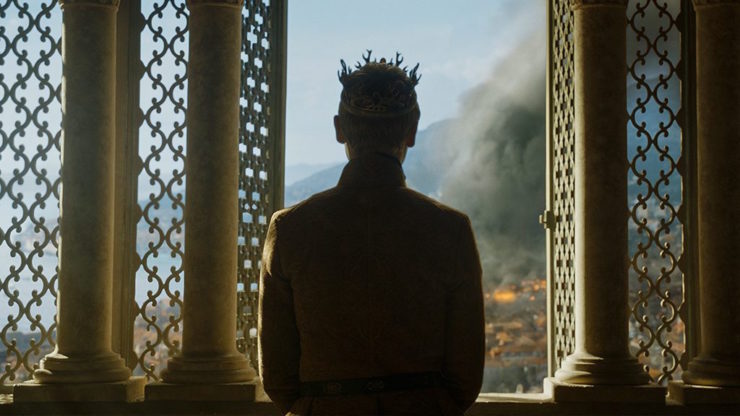If you’ve got ten or so hours to spare between now and July 16th, I highly recommend binge-devouring season six of Game of Thrones, even—or maybe especially—if you watched it when it aired last year. What seemed, week to week, like an inconsistent, fairly unsatisfying season (certain moments aside) turns out to be a solid stretch of narrative setup and motion when you gulp it down in a sitting or three. Every season of intrigue and betrayal moves the narrative forward, but finally, by the end of season three, the pieces are in intriguing place on the board—places that suggest season seven will be a battle of consolidation and compromise as various parties begin to take the Night King’s threat seriously.
There’s going to be war. Everyone’s talking about it. But who’s left to fight?
Spoilers for all previous seasons follow, but I’ll leave the books out of it, except as they inform that one long-held, finally confirmed theory. You know the one.
King’s Landing
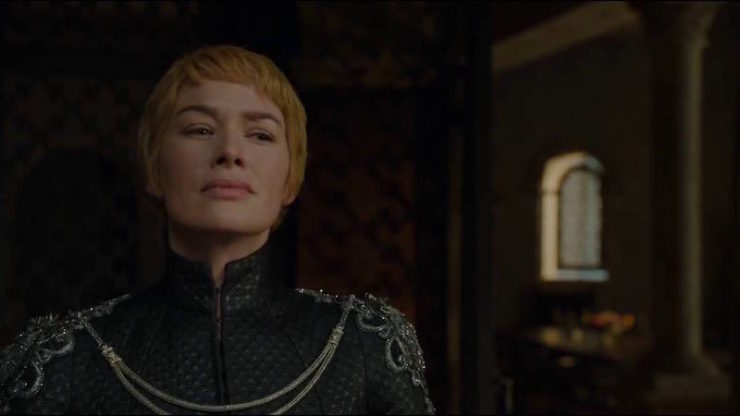
It’s important to remember, as Cersei proceeds to fuck absolutely everything up, that she started the season by learning of her daughter’s death. Young King Tommen is easily played by the High Sparrow, that master manipulator. Only a Tyrell could hope to work around him, and Margaery certainly tries. But the High Sparrow pulls everyone’s strings—until Cersei blows up the Sept of Baelor and much of King’s Landing with a stash of wildfire (which is what the Mad King was going to do, but Jaime killed him first). RIP Margaery, and to a lesser degree Mace and Loras Tyrell; goodbye, Kevan and Lancel Lannister; we hardly knew ye, lords and ladies of the court; good riddance, High Sparrow and the faith militant. Pycelle, you were not a good maester, but kinda sorry you got stabbed to death by Qyburn’s little birds. Sorry, Tommen: your mother loved you so fiercely, so misguidedly, it made her do even more unforgivable things.
Cersei is a fascinating disaster of a character—her actions with what’s left of Gregor Clegane and the Septa are just about on par with something a Bolton might do—and will make a terrible queen. But those left to challenge her and her outstanding metal shoulderpads are very far away. And what will her brother say?
Braavos
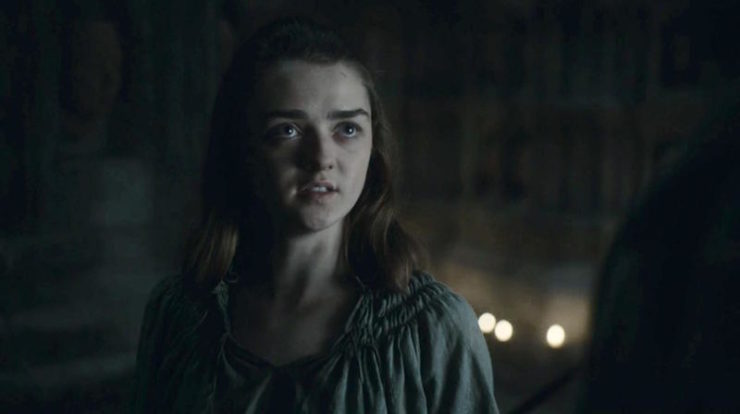
Arya doesn’t stay blind for long, but she does spend a lot of time getting hit in the face. It’s a wonder she still has teeth. It’s equally surprising that she still has compassion: the House of Black and White teaches her a lot, but she can’t learn not to care about people, and to kill indiscriminately. She can’t carry out the order to kill Lady Crane (not that that saves her; RIP, best actress); she can’t stop being Arya Stark after all. Is there a bit of respect in the little nod Jaqen gives her when she says “A girl is Arya Stark of Winterfell, and I’m going home”?
The Riverlands
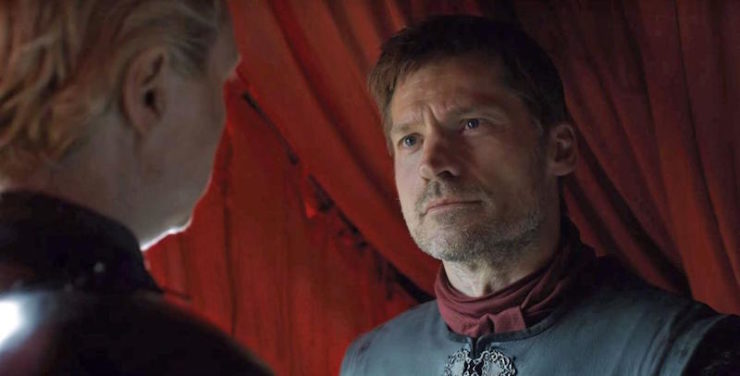
Walder Frey’s dumb sons failed to keep Riverrun, so Tommen sends Jaime (stripped of his position in the Kingsguard) to take it back. RIP Blackfish, and your nifty armor; back to a Frey dungeon with you, Edmure Tully. Edmure has one very key line when he sneers at Jaime, “All of us have to believe we’re decent, don’t we?” It’s a valid question—unless you’re Ramsay Bolton, I guess. Jaime and Brienne have a brief moment in which they remind us that they respect each other, even if no one else respects either of them. (And he tells her to keep his sword.)
With Riverrun back in Frey/Lannister hands, Walder Frey is insufferable once again—but his glory is cut short when Arya turns up, feeds him Frey pie, and cuts his throat. (Would you really not notice you were eating toes?) Now who holds the Riverlands?
North of the Wall
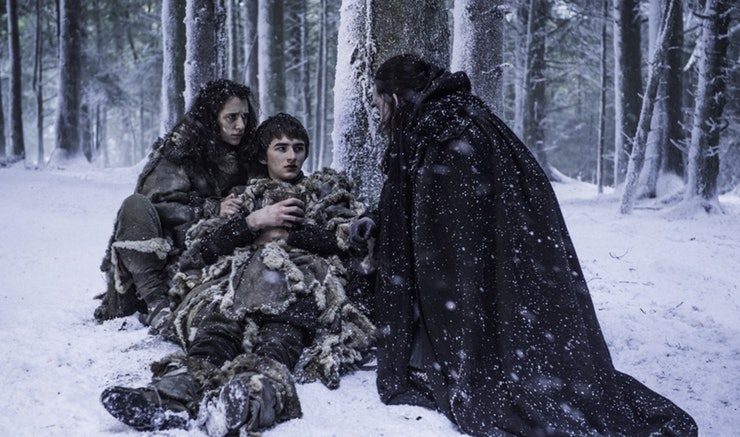
Bran’s story is mostly about other stories: he’s the mechanism by which Hodor’s past, Jon’s parentage, and the Night King’s creation are explained (you can’t really blame the Children of the Forest, can you? They’re just another piece of this cycle of violence). Bran’s vision of Ned Stark and Arthur Dayne starts early in the season, but doesn’t end until the finale, when Bran follows his father to find what was long suspected: a dying Lyanna Stark handing her son over to Ned. Just to nail down the connection, the scene cuts from the baby’s eyes to Jon’s.
“The past is already written. The ink is dry,” the Three-Eyed Raven tells Bran, but is it? Can it be, when Bran-in-the-present turns Hodor-in-the-past into the person Hodor is? Hodor, in the end, is used terribly; RIP, Hodor, you deserved better. So many people die saving Bran, and yet it’s not entirely clear why he’s so important. On the plus side, zombie Benjen Stark also saves Meera and Bran and tells them there’s magic built into the Wall. So long as it stands, the dead cannot pass.
Good luck, Wall.
The North
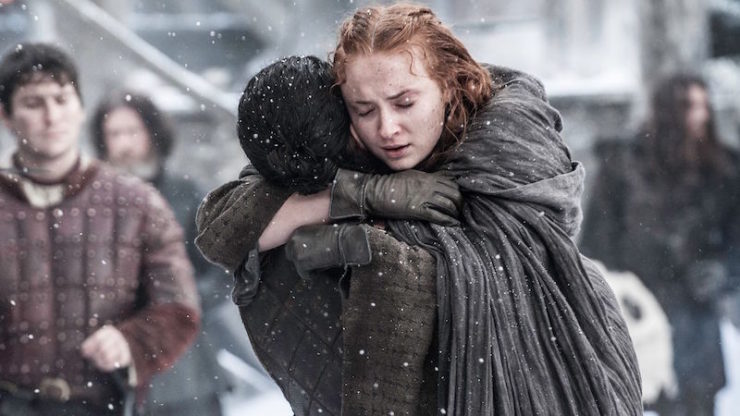
Jon Snow came back to life! Weren’t you surprised? We still don’t really know what the reveal about Melisandre—that she’s an old woman in disguise—means, though it puts some weight behind her saying that she’s been ready to die for a long time. She brings Jon back, but it doesn’t solve her problems—not when Davos finally learns what happened to Shireen.
So very much happens in the North: Brienne pledges her service to Sansa, in a moment that gave me a whole lot of feels. Tormund ogles Brienne, a moment that launched a thousand gifs. Jon and Sansa reunite. Littlefinger is a creep, and Sansa lays into him for handing her over to Ramsay Bolton. We’re introduced to fierce Lyanna Mormont, who would probably be the best Queen in the North. A lot of negotiation and compromise happens surrounding who will fight, and for whom, and when. A divided north, as Davos points out, cannot fight the Night King.
But the North first must defeat Ramsay, who in the span of a few episodes kills his dad, his stepmother, his baby brother, Osha, Rickon, and probably half of his own army. The Battle of the Bastards is an ugly, ugly fight, and when it’s over, it hardly seems like there’s anyone left on either side—except the Knights of the Vale, who Sansa summoned without telling Jon. Still, the day is saved; the direwolf banner hangs from the walls of Winterfell, and the lords of the North are rallied behind the Starks once again.
Meereen & Surrounds
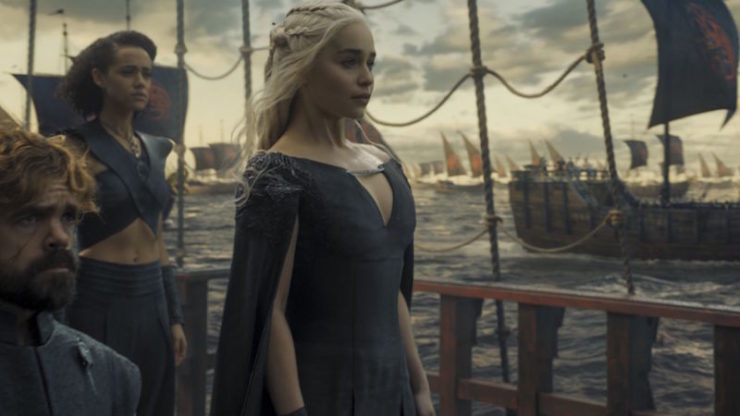
After Dany burns up all the khals in her escape from the Dosh Khaleen, the Dothraki are happy to follow her—not just to Meereen, but all the way to Westeros. In theory Daario Noharis and Jorah Mormont help Dany escape, but really, she does most of it herself—then commands twice-banished Jorah to go find the cure for his greyscale.
In Meereen, Tyrion befriends the dragons, convinces Greyworm and Missandei to try wine and crack terrible jokes, enlists the Red Priestesses to preach Dany’s benevolent greatness, and does a pretty decent job as Dany’s advisor (along with Varys). With the slavers destroyed, and multiple armies and ships at her command, Dany starts putting all her ducks (and dragons) in a row. She makes a deal with Yara, after bonding with her about their shitty fathers; the two of them might just succeed at leaving the world better than they found it. She leaves Daario and his Second Sons to keep the peace in Meereen, which may or may not work out. And she makes Tyrion Hand of the Queen in an unexpectedly moving scene. “I believe in you,” he tells the dragon queen, before they all—Dothraki, Unsullied, Tyrion, Varys, a lot of Ironborn, and Daenerys Targaryen, first of her name—set sail for Westeros under a dragon-filled sky.
Elsewhere
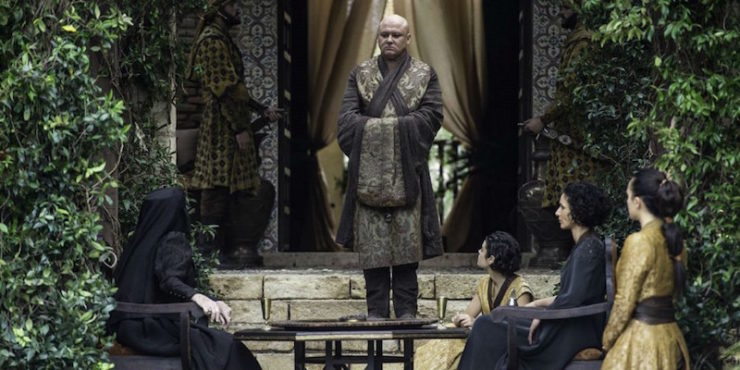
Though it only appears briefly, Dorne makes a play for new relevance when the Sand Snakes murder their prince and his son. Dorne isn’t seen again until Olenna Tyrell comes to form an alliance in the season finale. (Are there any other Tyrells left?) When Varys turns up and says “Fire and blood,” is it a promise or a threat?
Sam, Gilly, and baby Sam make their way to the Citadel, stopping for a chat with Sam’s real charmer of a dad—at least they liberate him of his large Valyrian steel blade on their way out. (The Citadel had one small but intriguing reveal: the spinny things from the credits that have never really made sense? They hang in the Citadel library, each looking like a combination chandelier/orrery.)
In the Iron Islands, Yara’s bid for the Salt Throne is thwarted by her crappy uncle Euron, who pushed his brother, King Balon, off a bridge and now is coming for his niece and nephew.
And somewhere in mid-Westeros, the Hound finds someone who believes he can be good; will he try? He runs into (and doesn’t kill) the Brotherhood Without Banners, who are off to fight the cold winds in the north. But the septon’s words are likely to haunt Sandor: “Violence is a disease. You don’t cure a disease by spreading it to more people.”
What if you’re not fighting people, though?
Molly Templeton is Tor.com’s publicity coordinator. She is a former bookseller with a lot of opinions about Buffy, among other things. You can also find her on Twitter.










